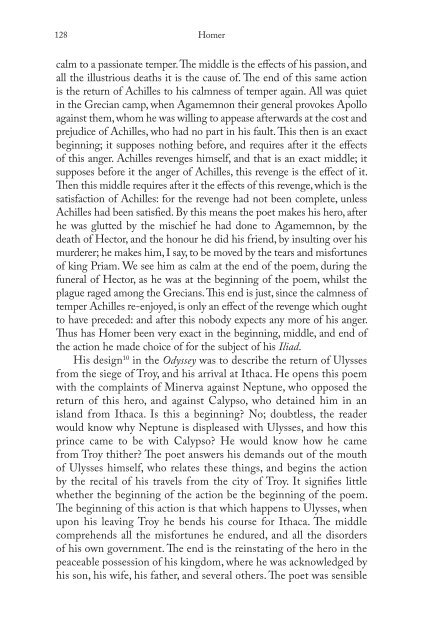Blooms Literary Themes - THE TRICKSTER.pdf - ymerleksi - home
Blooms Literary Themes - THE TRICKSTER.pdf - ymerleksi - home
Blooms Literary Themes - THE TRICKSTER.pdf - ymerleksi - home
You also want an ePaper? Increase the reach of your titles
YUMPU automatically turns print PDFs into web optimized ePapers that Google loves.
128<br />
Homer<br />
calm to a passionate temper. Th e middle is the eff ects of his passion, and<br />
all the illustrious deaths it is the cause of. Th e end of this same action<br />
is the return of Achilles to his calmness of temper again. All was quiet<br />
in the Grecian camp, when Agamemnon their general provokes Apollo<br />
against them, whom he was willing to appease afterwards at the cost and<br />
prejudice of Achilles, who had no part in his fault. Th is then is an exact<br />
beginning; it supposes nothing before, and requires after it the eff ects<br />
of this anger. Achilles revenges himself, and that is an exact middle; it<br />
supposes before it the anger of Achilles, this revenge is the eff ect of it.<br />
Th en this middle requires after it the eff ects of this revenge, which is the<br />
satisfaction of Achilles: for the revenge had not been complete, unless<br />
Achilles had been satisfi ed. By this means the poet makes his hero, after<br />
he was glutted by the mischief he had done to Agamemnon, by the<br />
death of Hector, and the honour he did his friend, by insulting over his<br />
murderer; he makes him, I say, to be moved by the tears and misfortunes<br />
of king Priam. We see him as calm at the end of the poem, during the<br />
funeral of Hector, as he was at the beginning of the poem, whilst the<br />
plague raged among the Grecians. Th is end is just, since the calmness of<br />
temper Achilles re-enjoyed, is only an eff ect of the revenge which ought<br />
to have preceded: and after this nobody expects any more of his anger.<br />
Th us has Homer been very exact in the beginning, middle, and end of<br />
the action he made choice of for the subject of his Iliad.<br />
His design 10 in the Odyssey was to describe the return of Ulysses<br />
from the siege of Troy, and his arrival at Ithaca. He opens this poem<br />
with the complaints of Minerva against Neptune, who opposed the<br />
return of this hero, and against Calypso, who detained him in an<br />
island from Ithaca. Is this a beginning? No; doubtless, the reader<br />
would know why Neptune is displeased with Ulysses, and how this<br />
prince came to be with Calypso? He would know how he came<br />
from Troy thither? Th e poet answers his demands out of the mouth<br />
of Ulysses himself, who relates these things, and begins the action<br />
by the recital of his travels from the city of Troy. It signifi es little<br />
whether the beginning of the action be the beginning of the poem.<br />
Th e beginning of this action is that which happens to Ulysses, when<br />
upon his leaving Troy he bends his course for Ithaca. Th e middle<br />
comprehends all the misfortunes he endured, and all the disorders<br />
of his own government. Th e end is the reinstating of the hero in the<br />
peaceable possession of his kingdom, where he was acknowledged by<br />
his son, his wife, his father, and several others. Th e poet was sensible

















